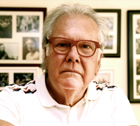There was a tectonic shift in New South Wales politics today when the Nationals elected 44-year-old ex-police inspector Troy Grant as their new leader and he automatically became Deputy Premier.
Grant is a political novice. Elected MP for Dubbo in March 2011, he had been a junior minister for just six months when Mike Baird succeeded Barry O’Farrell as Premier. Grant and his deputy leader Adrian Piccoli, MP for Murrumbidgee, are “freshwater” Nationals — i.e. they come from electorates west of the Great Dividing Range. The outgoing leader, Andrew Stoner, was a “saltwater” National from Oxley on the mid-NSW coast. (Opposition Leader John Robertson cruelly referred to him as “the Oxley-moron”). The differences between the “freshies” and the “salties” have been exacerbated in recent years by the bitter controversy over exploration and drilling for coal seam gas (CSG).
“Everyone is yelling at each other, no one is listening,” Grant said at his first press conference at Parliament House this morning. He promised a more rational and inclusive policy which addressed the concerns of all stakeholders.
As a rule, “freshies” have tended to be protective of farmland and underground water tables and they are suspicious of the CSG industry, while “salties” have more or less followed faithfully the pro-gas policies of their pro-business Liberal partners.
By shifting the balance from “salties” to “freshies”, the communities of western and outback NSW have been elevated a peg or two. This represents a dramatic change from the policy investments of state governments over the past 25 years, when NSW came to mean Newcastle-Sydney-Wollongong.
“I am a son of regional NSW,” Grant said. “As the new Nationals leader I am ready, willing and able to give back to those communities that have suffered for too long. Those days are over.”
The Nationals hold 19 seats in the Legislative Assembly — one has been abolished in a redistribution — and their constituencies cover 92% of the state’s land mass.
They will stand 19 candidates at the March 28 election and are on track to win 18 of them. A question mark hangs over Cessnock, where their “star” candidate is Melbourne-born rock singer Angry Anderson.
Anderson contested the federal seat of Throsby for the Nationals in 2011 but failed to impress. His name is soon to be added to the Elvis Festival’s Wall of Fame in Parkes, but it is hard to see a tattooed 67-year-old rocker impressing the burghers of Cessnock, where Labor’s Clayton Barr is the sitting MP.
Perhaps he should adopt We Can’t Be Beaten, one of his old hits, as his campaign song. Anything’s worth a try …








Alex just wondering if you talked to any anti-csg campaigners in the so called “freshies” electorates? If you came out here and chatted you might find a very different view. Many landowners have been talking to these guys for a long time and get no support at all in their fight against csg. The Nats are mining all the way. They will not even engage in any real factual discussion and simply want to paint 4th and 5th generation farmers as “trained activists”. When 70yr law abiding farmers are “locking on” to drill rigs you have to know something is very wrong. There are some interesting stories out here … just talk to the right people!
The very fact that rural voters continue to vote Nat.(State or Federal) is as perfect an example of cognitive dissonance as could be imagined – they have consistently ignored, sold out and shafted by their MPs who just want to keep them bums on that soft parliamentary leather – beats a tractor seat plus a gold plated pension as long as the BigAr$e end of town is served.
“…when NSW came to mean Newcastle-Sydney-Wollongong.”- are you joking? Have a walk down the bottom end of Hunter st, Newcastle. The lion’s share of ‘policy investment’ has been outright pork-barreling in marginal seats, not Newcastle or Wollongong.